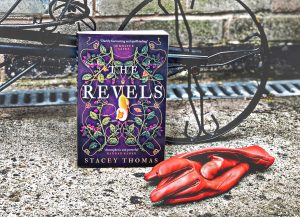THE REVELS by Stacey Thomas (BOOK REVIEW)
“The dead do not rest easy, and I am full of their secrets.”
In 1645 King Charles and Parliament were at odds with one another. Whilst witch-hunting was abolished by the King, where there were women who dared to fall in love, dared to show an ounce of power, to rise above their station or to show courage, there were those who would denounce it as witchcraft. Parliament, though in the midst of a civil war, feeling it their duty to uphold the nation’s pious beliefs, began to call for the rise of witch-hunters once more to rid England of the Devil’s presence. And so began the gruelling witch trials that saw countless women wrongly executed.
The Revels by Stacey Thomas is a powerful historical fantasy debut which captures its readers and binds them in knots, desperately burning through pages whilst all begins to unravel. This is a witchy tale that both challenges and sympathies with its characters as they journey through a world that would rather condemn them for being alive than see them prosper.

Nicholas Pearce, our main protagonist, is called home following the death of his brother, Francis. Wrapped in guilt for encouraging his brother to join the Royalist army, Nicholas enters an uneasy bargain with his father which sees him abandoning his potential career as a playwright and entering an apprenticeship with Judge William Percival, a former renowned witch-hunter. Unfortunately for Nicholas this is the last person he ever wanted to be charged to, for he harbours a dangerous secret, Nicholson can hear the dead sing. Fearing that this will see him hanged for witchcraft, he conceals what the dead reveal in their songs and keeps their burdens to himself. Yet with the rising demand for witch-hunters, William Percival is pressured into returning to his old occupation and Nicholas is tied to him. How long can Nicholas hide his true self? How many innocent lives can he watch be destroyed before he speaks up?
The tone of this novel is superb from the very onset. Thomas’s prose is incredibly atmospheric, mixing melancholy with formality and creating an air of tension, darkness, whilst painting a gothic scene which really immersed me into the time period. This was a time when religion was so deeply embedded into society that it was no wonder fear of devilry and curses made the people susceptible to any given whisper of witchcraft. It was easy to see how even the most ridiculous claims, even ones of women flying and sending imps or familiars to do their bidding, could be believed. However, in Thomas’ novel certain powers do exist, that of knot magic, having the power to manipulate others and of hearing the dead. Yet for all those accused most were wrongfully so, and not all who had powers used them for malice; even so the atrocities they all faced was unimaginable, which Thomas does not shy away from. Throughout I was always on the edge of my seat knowing that no character, even Nicholas and William Percival himself, were safe from facing execution and so I feared for the twists that I knew would come.
“I have always been in two parts. As though half of me is standing behind the curtains watching to see how my other half plays before the crowd. I am still in two parts, but it is as though Althamia has caught sight of us both and rather than recoil, she steps closer.”
I love the way Thomas juxtaposes witch trials to that of a theatre play, where the crowd gain as much enjoyment of seeing a woman or man condemned, stripped of all dignity and hanging from the end of a rope, as to watching a comedy on stage. Society during the sixteenth century was engineered with roles to be played and expectations to be met, which Thomas reflects upon with much historical detail. For example women were expected to marry and do nothing more than care for the family, and so a character such as Althamia, who Nicholas becomes fond of, was an easy target to claim as a witch for her desire to become a doctor and for taking an interest in taxidermy. There are a few uncomfortable scenes where we the reader bear witness to the way witch-hunters coerced ‘confessions’ from the accused, but these scenes are also emotively powerful. Nicholas’ objection and anger towards the cruelty brings into light how easily mistreated women were at that time, and we in turn feel this anger, as we should. With every death and every song sung by the victims, he knows the truth of their demise, he knows the horrors they had faced in life and so Nicholas’s narration not only casts a critical eye over those around him who make sport of convicting women of witchcraft out of superiority, jealousy or sheer maliciousness but also at his own involvement in the affairs. This I particularly appreciated because it is clear that Nicholas is a character who made a lot of mistakes, who thought of his own survival at the expense of others, and that his actions or lack of had dire consequences for others—It was right to see him acknowledge that.
Yet on the other hand Nicholas was as vulnerable as the women, he had to hide a part of himself or face the same punishment. Nicholas was a puppet and his strings were pulled by corrupt men, firstly by his father and then by witch-hunters such as Clements and Rush who covet their small amount of power, and so knowing how best to protect himself and those he cared for, particularly Althamia, became even harder the more embedded with these men he became. The only measure of kindness and understanding he really received was by his father’s valet Stephens and by William Percival, a man who held his own secrets, one that given the attitudes of that era, would see him punished and shamed in the same manner as witches. Thomas shows us that it was a cutthroat time period for all, where the only way for characters such as Clements, General Witchfinder Rush and even Grace, a woman who used her powers to control minds, to rise was to see the ruin of others.
“Her shoulders slump and she studies the fire. ‘Before, I was something to be protected. Now I am something to be shunted away. Yet I am what I always was: an object to be manoeuvred.”
This is a novel which certainly flourishes in enriching the narrative with historical authenticity, tense drama, and a dark atmosphere whereby Thomas effortlessly holds her audience captive until the final curtain falls. The Revels enlightened me in many ways, this is a debut not to be missed.
ARC provided by Becci at HQ Stories in exchange for an honest review. Thank you for the copy!
The Revels is available now. You can order your copy on Bookshop.org

